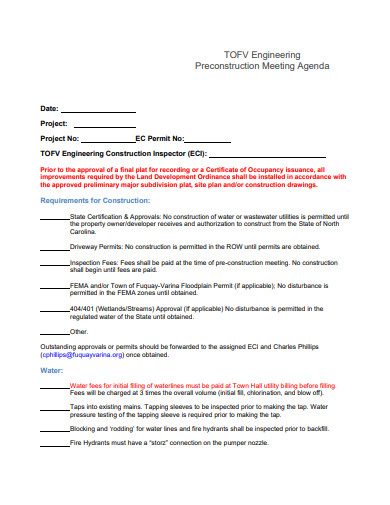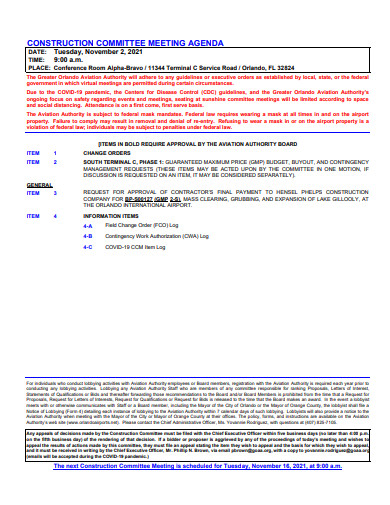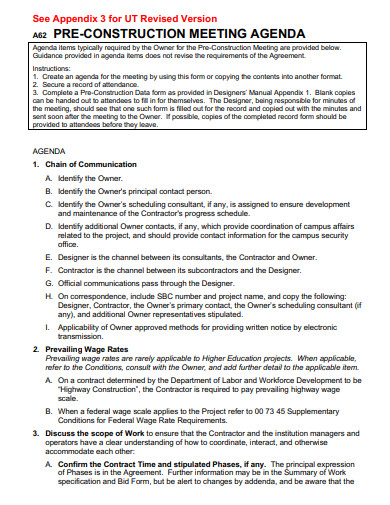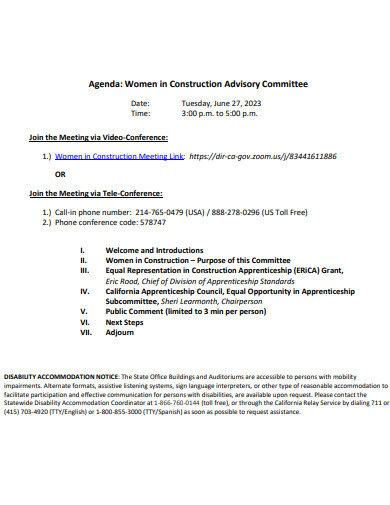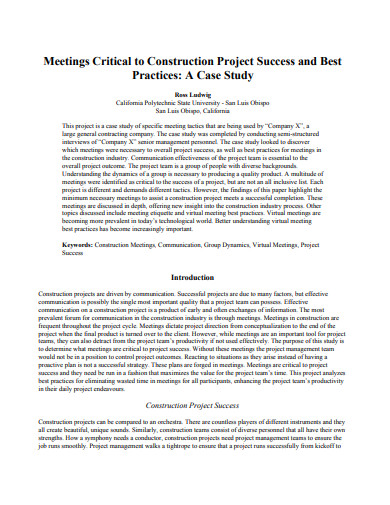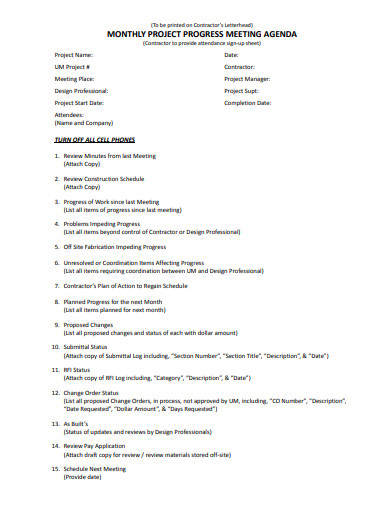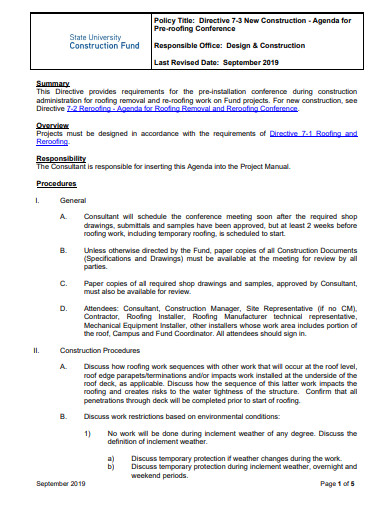Embarking on a construction project involves meticulous planning and coordination. At the heart of successful coordination lies effective communication, and that’s where our Sample Construction Meeting Agenda Template comes into play. Tailored for the dynamic world of construction, this comprehensive guide offers a strategic framework to streamline discussions, prioritize tasks, and ensure all stakeholders are aligned. Harness the power of organized collaboration and let our template be the cornerstone of your construction project’s success. Dive deeper to transform your meetings into masterful blueprints of achievement.
10+ Construction Meeting Agenda Samples
1. Construction Meeting Agenda Template
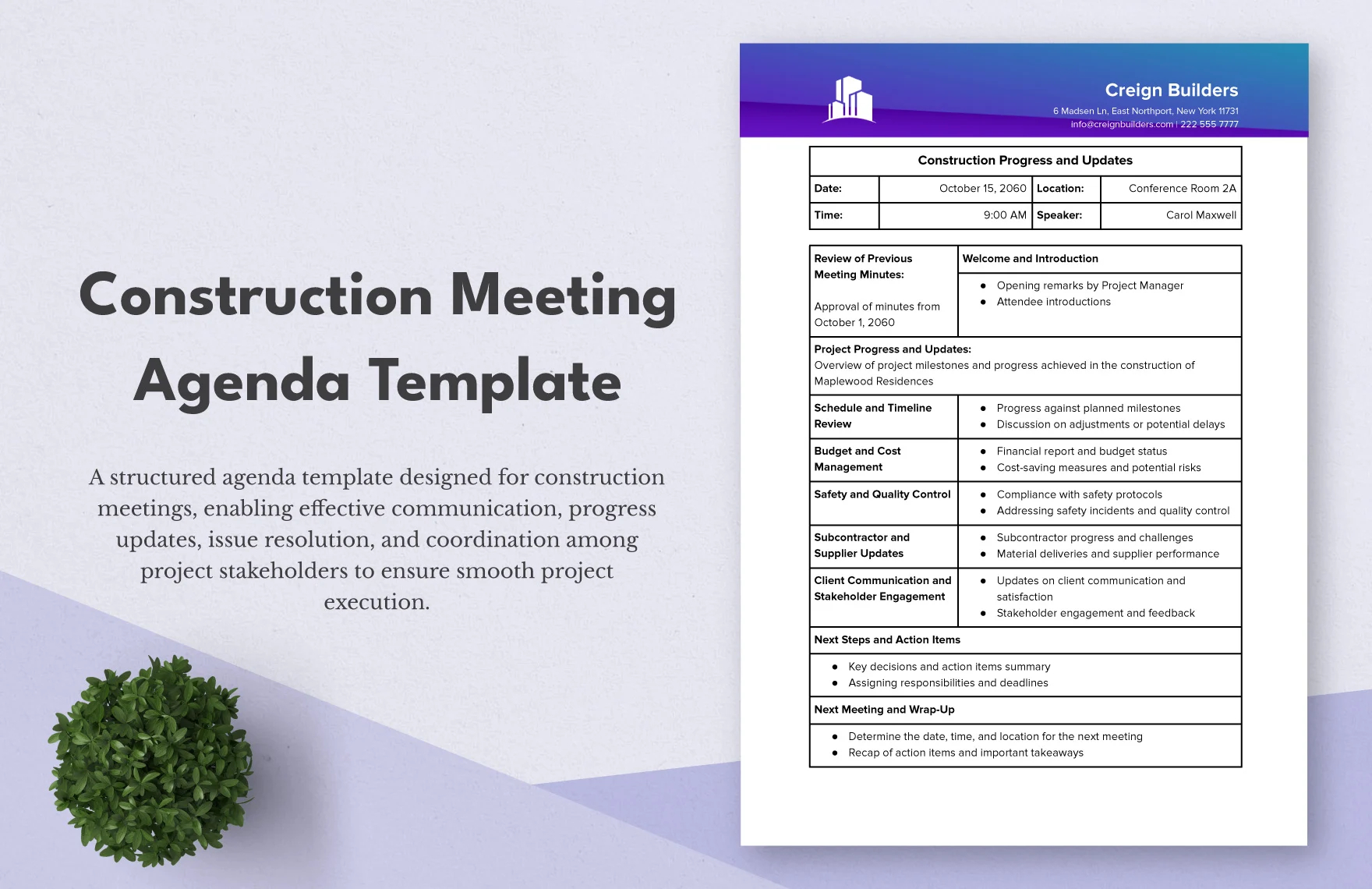
2. Meeting Agenda Template
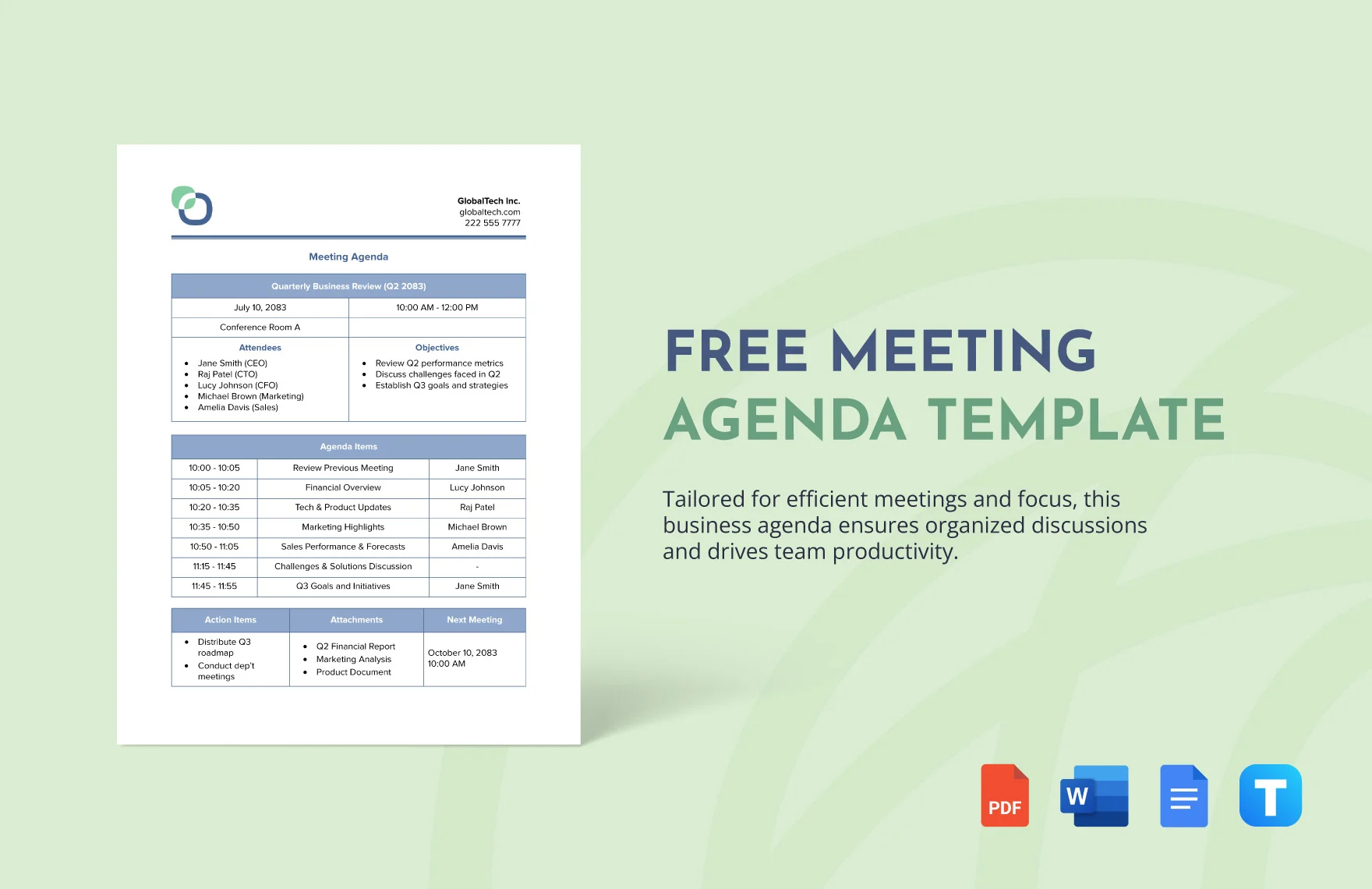
3. Short Meeting Agenda Template
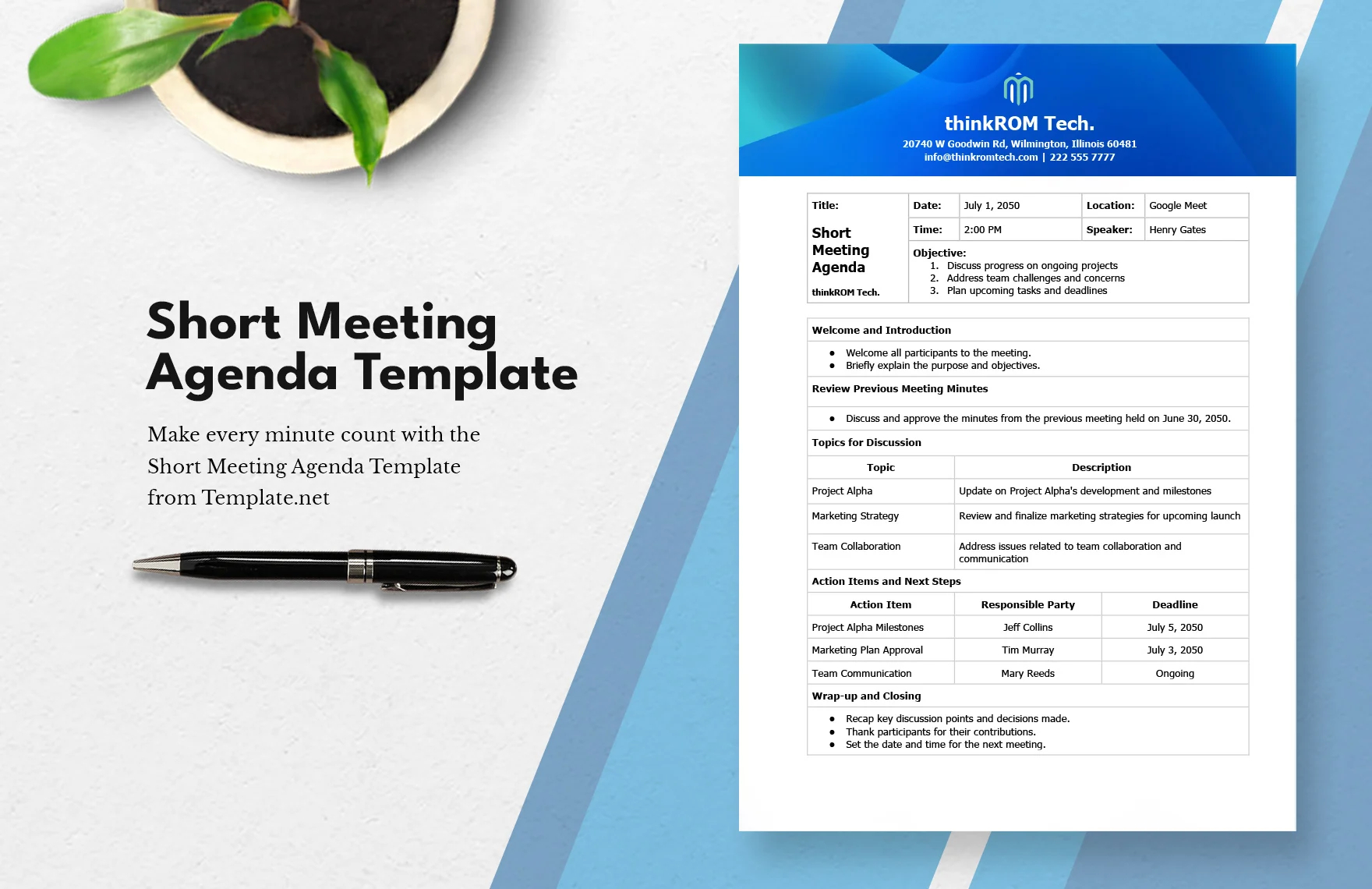
4. Meeting Agenda Layout Template
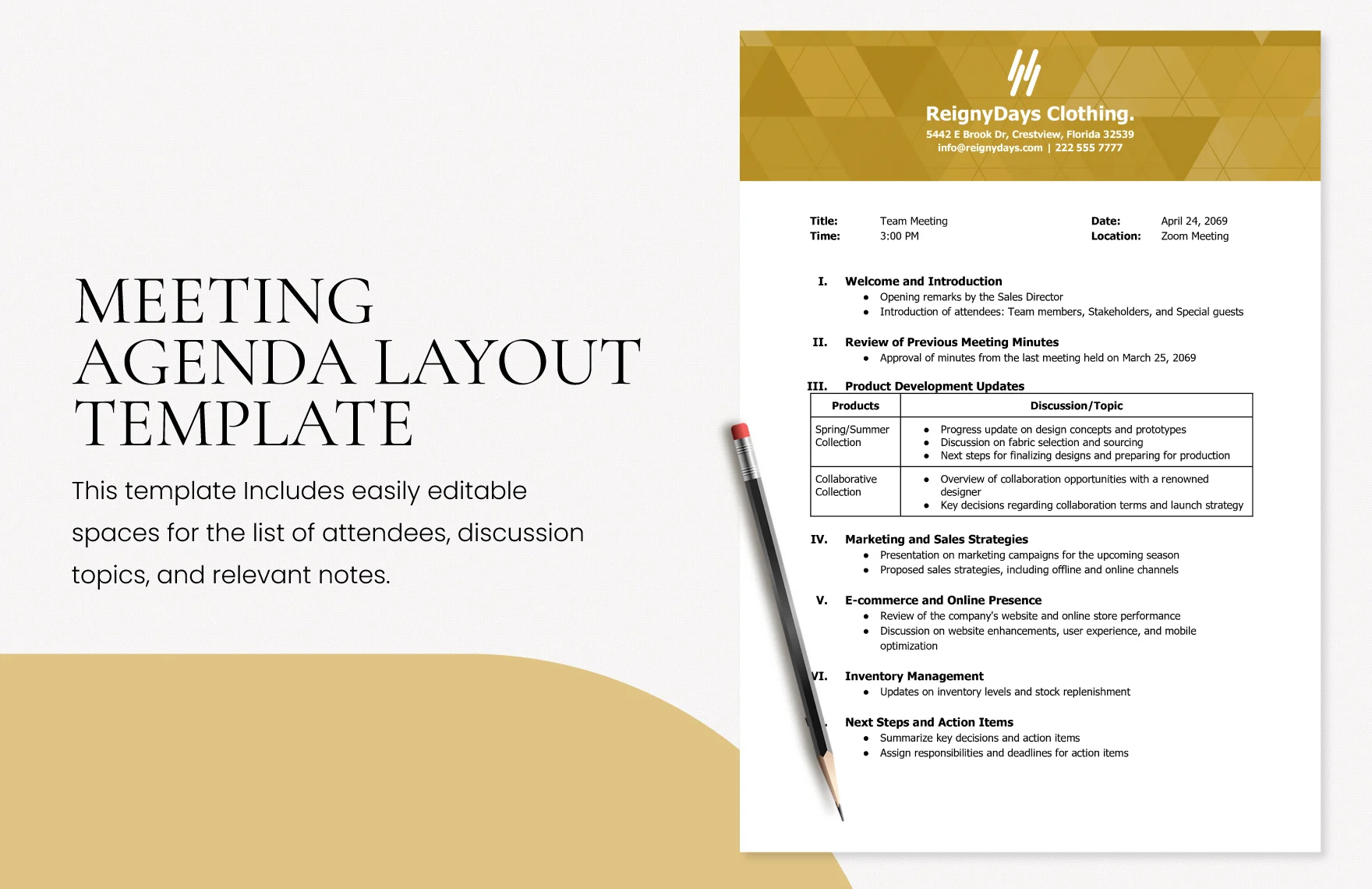
What Is a Construction Meeting Agenda?
A construction meeting agenda is a meticulously crafted document that outlines the main topics, issues, and discussions set to take place during a construction-related meeting. Given the multi-faceted nature of construction projects, which often involve various stakeholders from contractors to architects and investors, having a clear and concise sample agenda becomes paramount to ensure that every voice is heard and every issue addressed.
Purpose and Importance:
The primary purpose of a construction meeting agenda is to bring structure and focus to a gathering. Without it, meetings can easily devolve into unproductive discussions or, worse, overlook critical issues altogether.
Efficiency: The agenda provides a roadmap for the meeting, ensuring that time is not wasted on irrelevant topics. Every minute in a construction project can equate to significant monetary implications, so optimizing the duration and content of discussions is essential.
Clarity: The agenda offers clarity to all participants about what to expect from the meeting. This enables participants to prepare in advance, bringing pertinent information or solutions to the table.
Accountability: By listing down items and allocating time for each, the agenda holds attendees accountable for addressing their respective topics or responsibilities.
Key Components of a Construction Meeting Agenda:
- Header: This includes the date, time, location, and names of the attendees.
- Objectives: Clearly stating the primary goals of the meeting, be it reviewing a project milestone, discussing budgetary concerns, or evaluating safety protocols.
- Old Business: Topics or issues from previous meetings that need revisiting or resolution.
- New Business: New topics or concerns that have emerged since the last meeting.
- Project Updates: A segment where each department or team can provide updates on their progress, challenges faced, and any assistance required.
- Open Floor: A designated time towards the end of the meeting where attendees can bring up miscellaneous topics or concerns not listed in the initial agenda.
- Action Items & Assignments: A recap of the decisions made during the meeting, along with assigning tasks or responsibilities to specific individuals or teams.
- Next Meeting Schedule: Details of the next planned meeting.
- Closing Remarks: A segment for concluding thoughts or motivational words from the team leaders or senior management.
The Flexibility Factor:
While the aforementioned components are typical, it’s important to remember that construction meeting agendas should be flexible. Every construction project is unique, with its own set of challenges and priorities. Thus, agendas should be tailored to fit the specific needs of each project and the stakeholders involved.
In essence, a construction meeting agenda is not merely a list of topics; it’s a strategic tool that drives productivity, fosters effective communication, and ensures that construction projects remain on track. Given the myriad of moving parts in any construction endeavor, a well-defined agenda is the anchor that ensures everyone is aligned, informed, and working towards a common goal.
5. Engineering Preconstruction Meeting Agenda Template
6. Construction Committee Meeting Agenda Template
7. Pre-Construction Meeting Agenda Template
8. Construction Advisory Committee Meeting Agenda Template
Why Are Construction Meeting Agendas Important?
In the world of construction, where projects are vast and often involve numerous stakeholders with varying objectives, the importance of structure and organized communication cannot be overstated. The construction meeting agenda plays a pivotal role in this arena, acting as the backbone of successful project discussions. But what makes them so indispensable?
1. Provides Direction and Structure:
Every meeting has a purpose, and in the context of construction, this could range from discussing architectural plans, sample budget adjustments, to safety protocols. A construction meeting agenda lays out the framework for the discussion, ensuring that all participants are aligned in their objectives and that the meeting progresses systematically. Without this guiding document, discussions can easily go off track, leading to longer meetings with less productive outcomes.
2. Facilitates Preparation:
When participants know the topics of discussion in advance, they can come prepared. Whether it’s gathering necessary documents, formulating solutions to existing problems, or brainstorming innovative ideas, an agenda allows attendees to contribute more effectively, ensuring the meeting’s success.
3. Encourages Accountability:
Listing topics and assigning them to specific individuals or teams promotes responsibility. Stakeholders know what is expected of them and are accountable for addressing their respective agenda points. This can lead to more diligent work outside the meeting, as everyone understands that they will be discussing their responsibilities in a shared space.
4. Time Management:
Time is money, especially in construction, where delays can lead to significant cost overruns. An agenda sets a clear timeframe for each topic, ensuring that the meeting remains time-efficient and that all critical subjects are covered. It helps in prioritizing crucial points, ensuring they get addressed first and aren’t rushed at the end.
5. Fosters Open Communication:
A well-structured agenda often includes time for open discussions. This ensures that even topics not initially on the agenda get voiced, promoting an environment of open communication where every stakeholder, regardless of their position, feels their concerns are heard.
6. Records and Follow-ups:
Agendas, especially when accompanied by minutes, serve as a record of what was discussed. This is invaluable for those who might not have been able to attend the meeting, providing a clear synopsis of the discussion points. Moreover, they facilitate follow-ups, ensuring decisions made aren’t lost in the shuffle and are acted upon.
7. Boosts Stakeholder Confidence:
External stakeholders, such as investors or regulatory bodies, gain confidence when they see a project is being managed with organized, structured meetings. An agenda reflects professionalism and a commitment to efficient project management.
In the intricate dance of construction project management, the construction meeting agenda emerges not just as a document, but as a catalyst for efficiency, collaboration, and success. It is the linchpin that holds together the myriad of discussions, decisions, and developments, ensuring that projects remain on track and all stakeholders are synchronized in their efforts.
9. Construction Project Meeting Agenda Template
10. Construction Project Progress Meeting Agenda Template
11. Construction Meeting Agenda in PDF
How to Create a Construction Meeting Agenda
Constructing monumental edifices requires not just materials and manpower, but meticulous planning and communication. An essential tool for this structured dialogue is the construction meeting agenda. By fostering clarity and productivity, an agenda is the compass guiding your project’s discussions. Here’s a step-by-step guide on how to create an effective construction meeting agenda:
1. Identify the Meeting’s Purpose:
Before you pen down any points, determine the primary objective of the meeting. Are you discussing a project’s initial stages, reviewing milestones, or addressing challenges? The overarching purpose will dictate the specifics you need to include.
2. Collaborate with Key Stakeholders:
Reach out to essential team members – be it project managers, engineers, or contractors – to gather input. This collaboration ensures that all critical topics are included and that no blind spots remain.
3. Start with Basic Details:
The top of your agenda should include fundamental information:
Date and Time: This ensures everyone is synced up and there’s no confusion.
Location: Whether it’s a physical venue or a virtual meeting link.
Participants: List down expected attendees so everyone knows who will be present.
4. List Down Old Business:
Before jumping into new topics, revisit issues or topics from the previous meeting that may still be pending or require further discussion.
5. Detail New Business:
Here, you’ll incorporate the main discussion points. For clarity, it’s beneficial to break them down into categories:
Design and Architecture: Discuss plans, blueprints, or any changes in design.
Budgetary Concerns: Review financial aspects, budgets, and potential cost overruns.
Safety Protocols: Address any safety concerns and ensure all standards are met.
Timeline and Milestones: Review the project’s timeline, celebrate achieved milestones, and address any delays.
6. Allocate Time Slots:
To keep the meeting concise and productive, assign a specific duration to each topic. This ensures that no single issue monopolizes the entire meeting.
7. Designate Speakers or Leaders:
Identify who will lead each discussion point. This not only ensures that the topic is covered comprehensively but also that someone is accountable for it.
8. Include a Break (if necessary):
For longer meetings, it’s advisable to incorporate a short break. This gives participants a moment to rejuvenate, leading to more productive discussions afterward.
9. Open Floor Segment:
Always allocate some time for open discussions. This allows attendees to bring up topics or concerns not listed in the initial agenda, promoting inclusivity and comprehensive problem-solving.
10. Wrap-Up and Action Items:
Conclude with a recap of the decisions made and the action points to be taken. Assign responsibilities clearly, ensuring everyone knows their tasks post-meeting.
11. Set the Date for the Next Meeting:
Establishing a routine or at least setting the next meeting’s date ensures continuity and commitment.
A well-constructed meeting agenda is the backbone of successful project discussions in the construction world. By adhering to these steps, you not only pave the way for structured dialogue but also ensure that each meeting propels the project forward with clarity, focus, and decisive action.
Related Posts
FREE 10+ Family Meeting Agenda Samples in PDF
FREE 10+ Day Agenda Samples in MS Word | Pages | Google Docs | PDF
FREE 10+ Program Agenda Samples in PDF
FREE 10+ Committee Meeting Agenda Samples in MS Word | Pages | Google Docs | PDF
FREE 6+ Wedding Agenda Samples in MS Word | PDF
FREE 10+ Retreat Agenda Templates in PDF | MS Word
FREE 18+ Safety Agenda Samples & Templates in MS Word | PDF
FREE 10+ Board Agenda Samples & Templates in PDF | MS Word
FREE 10+ Interview Agenda Samples and Templates in PDF | MS Word
FREE 7+ Travel Agenda Samples and Templates in PDF
FREE 10+ Project Agenda Samples and Templates in PDF | MS Word
FREE 12+ Sales Agenda Templates in PDF | MS Word
FREE How Meeting Agendas Result in Actionable Productivity [ Making Your Meeting Agenda ]
FREE First Advisory Board Meeting Agenda [ Importance and Tips ]
FREE Strategies to Overcome the Risk to Your Company’s Agenda [ Definition, Steps for Overcoming Risks ]

